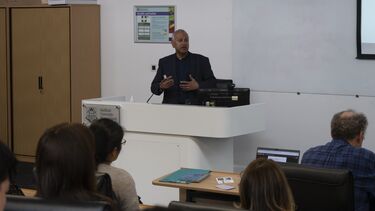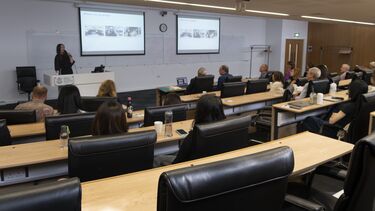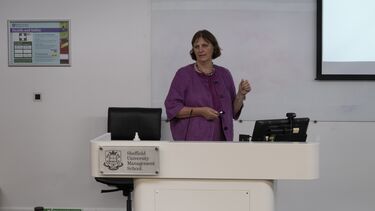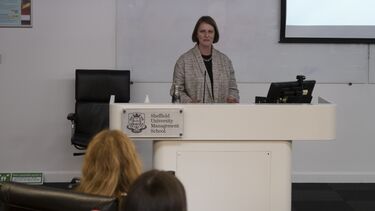We were pleased to welcome staff, both past and present, as well as students and alumni to ¾«¶«Ó°ÒµUniversity Management School and online for a fantastic celebration event, marking 30 years of IWP and 50 years of the MSc Occupational Psychology.
IWP has long been regarded as at the forefront of organisational psychology research into topics such as employee wellbeing, job design, innovation, leadership and teamworking, whilst the MSc has contributed hundreds of individuals to the practitioner community in the UK and across the world.
Professor Kamal Birdi, current IWP Director, began the proceedings with some reflections on the Institute’s history. Established in 1968 at the ¾«¶«Ó°Òµ, the Medical Research Council’s Social and Applied Psychology Unit (MRC), led by Professor Peter Warr, aimed to undertake ‘applied cognitive studies’ both in the lab and in work settings. Following funding changes, IWP was then established in 1994 to expand the scope and funding of occupational psychology research. The IWP was originally led by Professor Toby Wall, with co-directors Professor Chris Clegg and Professor Michael West. In 2010, it moved from its Mushroom Lane home and became part of the Management School on Conduit Road, where it is now home to over 20 academics and researchers.
Kamal took time to thank all of those who had contributed to the Institute over the years, particularly recognising previous directors:
- Toby Wall (1994-2006)
- Sharon Parker (2006-2009)
- Rod Nicolson (2009-2011)
- John Arnold (2011-2013)
- Malcolm Patterson (2013-2014)
- Jeremy Dawson (2014-2016)
- Karina Nielsen (2016-2021)
Since it was established, IWP has attracted £millions of grants including the ESRC Centre for Organisation and Innovation (1996-2006), published hundreds of papers, chapters, books and reports driving theoretical and methodological advancements and researched and worked with thousands of organisations, providing many practical and policy insights, recommendations and tools.
Dr Nicola Lawrence-Thomas, current MSc Business and Organisational Psychology Programme Director, reflected on the history of the programme, thanking all former directors:
- Toby Wall (1975-1983)
- Mike West (1983-1991)
- Nik Chmiel (1991-1998)
- Fiona Patterson (1998-2001)
- Christine Sprigg (2001-2006)
- Kamal Birdi (2006-2012)
- Carolyn Axtell (2012-2015)
- Laura Dean (2015-2023)
- Sam Farley (2023-2025)
She also looked to the future, with the programme’s new name as MSc Business and Organisational Psychology launching from September 2025. She highlighted the scientist-practitioner model embedded in the teaching and the opportunities students get to engage with advanced methodologies and technologies, such as with the iLab. The programme will continue to train students how to think, not what to think.
At the event, two distinguished keynote speakers shared their latest insights from academic research and from practice, as well as to remember individuals who made a significant impact on IWP and the MSc and are sadly no longer with us.
Professor Sharon Parker, former IWP Director and current ARC Laureate Fellow at Curtin Business School in Australia, delivered the Toby Wall Memorial Keynote. She introduced the recent Parker & Knight (2024) SMART model (Stimulating, Mastery, Agency, Relational, Tolerable demands) and discussed how well-designed jobs can benefit work performance, learning and employee well-being. She emphasised the challenges and opportunities related to the rising use of AI and the need to proactively consider work design before new technology is implemented.
Dr Antonia Dietmann, MSc Occupational Psychology alumna, Department of Work and Pensions Chief Psychologist and Head of the Government Occupational Psychology Profession, delivered the Christine Sprigg Memorial Keynote. She reflected on her experiences working as an Occupational Psychologist (OP) in various UK Government Departments. She described how the Policy Occupational Psychology team was bringing psychological research evidence into political decision-making processes in the Department of Work and Pensions, before stressing the need for OPs to share their evidence with policy-making bodies in an accessible and applicable way through as many channels as possible.
Thank you to everyone who joined us for the celebrations and who has contributed to the ongoing success of IWP and MSc Occupational Psychology over the decades! Here’s to many more!





